 |
 |
|
 |
|
|
||||
|
||||||||||||
© Looking for Lincoln Heritage Coalition • #1 Old State Capitol Plaza • Springfield, IL 62701 • 217.782.6817 |
|
The county seat of LaSalle County, Ottawa has included renovations to its historic mansion, the
Reddick Mansion, and artistic murals throughout the central business district. Several Ottawa
businesses have conducted historic renovations of central business properties. Ottawa is known as
the scenic gateway to Starved Rock State Park, the most popular state park in Illinois, with some
2 million visitors per year. The Fox River is also located in Ottawa, which flows through
communities like Elgin and Aurora empties into the Illinois in the downtown area. Visitors are
also encouraged to visit the Scouting Museum and enjoy a delightful Canal Boat Tour. |


|
|
Owen Lovejoy was Princeton's most famous resident and lived there from 1838 until his death in 1864.
Lovejoy was prominent in the abolition movement and the Underground Railroad, a founder of the Illinois
and national Republican party, and a congressional leaderIn addition, Reverend Lovejoy used his own home
to hide runaway slaves and in 1854 he was elected to the Illinois House of Representatives. Prior and
during the Civil War, Princeton became an important station on the Underground Railroad. |

|
|
Beardstown sits on the Illinois River and was first settled in 1819 which makes it one of the oldest towns
in Illinois. Lincoln argued many cases in the Beardstown Courthouse, including his best known-"The
Almanac Trial". Lincoln was also installed here as a Captain of the Sangamon County Company during the
Black Hawk War. During the senate race of 1858 he spoke to the people of Beardstown on the city square.
Stephen A. Douglas had spoken prior to Lincoln's speech. |
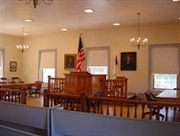

|
|
Interested in some history? Then Jacksonville is the perfect place to spend some time. |
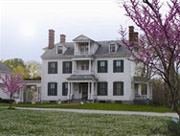
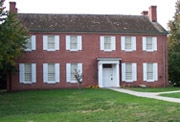
|
|
Located on the Mississippi River just above the confluence of the Mississippi and Missouri rivers
and just below the Mississippi and Illinois rivers, Alton is truly a "river city" rich in history.
Visitors can also visit the National Great Rivers Museum to learn more about this river city. |


|
|
Located less than thirty minutes from the heart of St. Louis, Lebanon, Illinois is a community
steeped in history for over 200 years. The original settlement was located to the south and east
section of the city and was populated in 1814. Lebanon was incorporated as a town in May, 1857
and organized as a city in 1874. |


|
|
The original log courthouse was erected in 1818 on the town square, but in a few years proved
to be too small for the rapidly growing county. In 1857, a new courthouse was constructed on
Market Street, a short distance northwest of the town square. This structure, which is still
in use, has had several additions to it. Standing next to the courthouse is one of the oldest
jails still functioning in the state. |
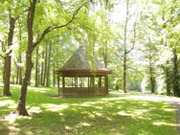

|
|
3. At a young age, John A. Logan rose to prominence in state politics. The Civil War brought him
national fame as a dashing, popular, and, perhaps, the best volunteer general. After the war,
Logan's Senate career, his leadership of the Grand Army of the Republic, and his campaign for the
Vice Presidency in 1884 made him one of the most famous men in the nation. |

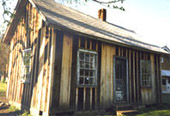
|
|
This Farm, five miles east of town, was established in 1824 by Michael Huffaker. Michael and his wife,
Jane, rode by horseback from Kentucky, bought land east of Jacksonville, and built a cabin for their
growing family and four cabins for free black families who helped Michael raise cattle, horses and
crops. In 1840 he built the two story brick home which stands to this day on the property. Michael
and his family were members of the Antioch Christian Church founded by Barton Stone. |
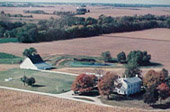

|
|
Washington Park Historic District, also known as Washington Square is a historic district in
and around Washington Park in the city of Ottawa, Illinois, USA. Washington Park was the site
of the first Lincoln-Douglas debates of 1858 and is surrounded by several historic structures.
The park was platted in 1831 and the historic district was added to the United States National
Register of Historic Places in 1973. |
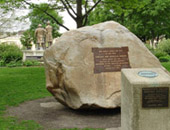
|
|
The Ottawa Heritage Tour is a must-have companion for your journey through Ottawa. Whether
you choose to take it by foot or by car, in the pages of the Heritage Tour you'll meet the
people who put Ottawa's name on the map and be able to explore the imposing architecture that
defines our skyline and residential neighborhoods. |
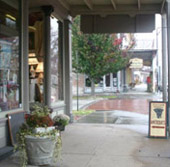

|
|
A Former Station on the Underground Railroad, the Lovejoy Homestead is located at the eastern edge of
Princeton, Illinois, and was the home of the Denham and Lovejoy families for nearly 100 years. |

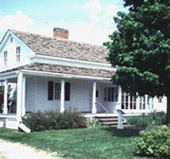
|
|
We hope you enjoy your time in Jacksonville, and the Looking for Lincoln - Voices of
Jacksonville audio tour. The tour is designed to make the voices of our history come
alive, and tell their stories in an interesting and educational way. The tour is
designed to be enjoyed by all ages, and all levels or interests in history. When you
arrive at each destination, tune your car radio to the frequency 92.5 FM or on the
posted sign. |

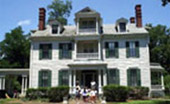
|
|
The seventh and last debate was held in Alton on October 16. Over 6,000 people gathered for the event which
was held in front of the City Hall. State and national figures were present as well as press representatives
from across the country. The debates had received national attention, with Lincoln campaigning on an
anti-slavery platform and Douglas as a States' Rights advocate. Lincoln's position that the U.S. could not
survive as a nation of half slave and half free states helped put him into the political limelight.
Although Lincoln lost the Senate race in 1858, he beat Douglas in the 1860 race for the U.S. Presidency. |


|
|
The Alton Museum of History and Art was founded in 1971 to preserve the great heritage of the Alton
community. Through the exhibits, they share with you our past and present so that you too may discover
the people, places and events that influenced our collective ancestors and continue to shape our destiny. |
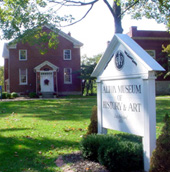
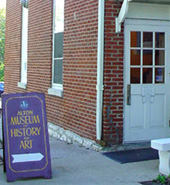
|
|
Walk with Alton and experience Alton's lasting legacies that helped shape the history of America
as you visit 10 Lincoln and Civil War sites in Alton. |


|
|
In the historic downtown Lebanon, visitors will find an unparalleled historic shopping district
with a mix of antique stores, quaint shops, restaurants, and other businesses. In the heart of
the shopping district is The Visitors Center where guests can view historic images of the town
and pick up information on the many community events that take place throughout the year. |


|
|
Built in 1830 and listed on the National Register of Historic Places, this hotel was visited by Charles
Dickens in 1842 and mentioned in his book, American Notes. |


|
|
Statues of Abraham Lincoln and Stephen A. Douglas on the site of their third of seven debates
which took place in Jonesboro, Illinois on September 15, 1858. In Commemoration
Directions/Location: |

|
|
In the heart of the Shawnee National Forest lies the Shawnee Hills Wine Trail, Illinois`
first and most award-winning trail. Twelve unique, family owned and operated, wineries
offer a diverse selection of nationally and internationally acclaimed wines for your
enjoyment and the rolling hills and sandstone bluffs offer views for all to enjoy. |
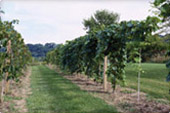

|
|
On the corner of the square, this historic Cass County Courthouse was built in 1844. This is
the original building in which Lincoln tried many cases including the famous “Almanac Trial”
in 1858. It is still being used as a courthouse today. Lincoln successfully defended Duff
Armstrong, the son of one of Lincoln’s old friends from New Salem. Armstrong was accused of
murder. The key witness claimed that he saw the whole thing clearly by the bright light of the
moon. Using an almanac, Lincoln proved that the moon would have set by the time of this murder,
thereby clearing Armstrong of the charges. The courthouse includes an original copy of that
edition of the almanac and a famous Lincoln photo taken during the trial. A small museum at the
rear of the courthouse features an extensive collection of antique firearms and Indian arrowheads. |



|
|
Elijah P. Lovejoy enraged some of Alton's citizens by actively supporting the organization of
the Anti-slavery Society of Illinois and establishing the Alton Observer as an abolitionist
newspaper. He continued writing and publishing even after three printing presses had been
destroyed and thrown into the Mississippi River. On the night of November 7, 1837, a group of
twenty supporters joined him at the Godfrey & Gilman warehouse to guard a new press until it
could be installed at the Observer. When a pro-slavery mob assembled outside the warehouse,
Alton's mayor tried to persuade the defenders inside to abandon the press. They refused and
the pro-slavery mob tried to set the warehouse on fire. As Lovejoy attempted to put out the
fire, he was killed by a shotgun blast. Lovejoy was buried on his 35th birthday,
November 9, 1837, in an unmarked grave in the Alton City Cemetery. |
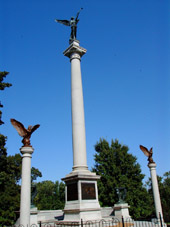
|
|
The Illinois River Road Scenic Byway preserves the natural river country along the banks
of the Illinois River, allowing modern visitors to travel the same route as the early
French explorers: les Voyageurs. The byway parallels the Illinois River Country Nature
Trail, a chain of over one hundred linked nature sites that offer outdoor recreation in
the Illinois River Valley. |
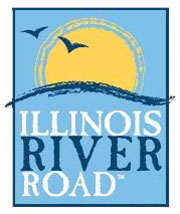

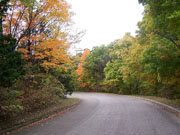
|